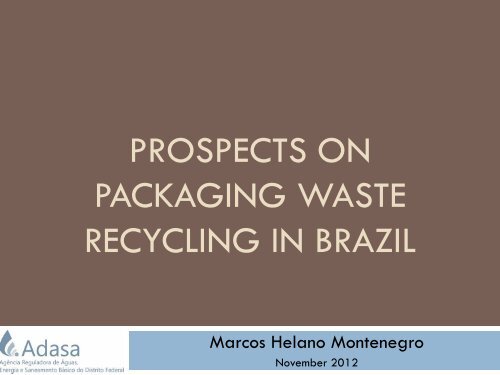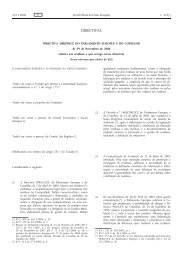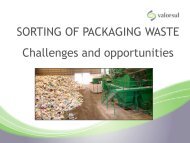PROSPECTS ON PACKAGING WASTE RECYCLING IN BRAZIL
PROSPECTS ON PACKAGING WASTE RECYCLING IN BRAZIL
PROSPECTS ON PACKAGING WASTE RECYCLING IN BRAZIL
Create successful ePaper yourself
Turn your PDF publications into a flip-book with our unique Google optimized e-Paper software.
<strong>PROSPECTS</strong> <strong>ON</strong><strong>PACKAG<strong>IN</strong>G</strong> <strong>WASTE</strong><strong>RECYCL<strong>IN</strong>G</strong> <strong>IN</strong> <strong>BRAZIL</strong>Marcos Helano MontenegroNovember 2012
Preliminary3The management of domestic solid wastes is a localpublic service, so its organization and execution is amunicipal responsibility.Brazilian municipalities must follow generaldirectives established by federal laws.Costs of services provision are partially supportedby local tax.Brazil has 5.565 municipalities.
4MSW Generation
5Evolution of MSW collectioncoverage (%)
Gravimetric Characterization ofBrazilian MSW6Does not include construction & demolitiondebris and industrial process wastes.
MSW Final Discards (2011)7All dumping sites must be closed in 2014.
LAW 12.305/2010SOLID <strong>WASTE</strong> NATI<strong>ON</strong>AL POLICY(SWNP)Law 12.305 / 2010
9Some bases of the Solid WasteNational PolicyPolluter pays principleProtector-receiver principleSolid waste management hierarchyIntegrated management plans at different levelsShared responsibility for products life cycle.
SWNP Wastes Hierarchy10The management and handling of solid wastes shouldobserve the following priority order : no generation reduction reuse recycling solid waste treatment environmentally appropriated final disposal of rejects
SWNP Emphasys on solid wastesintegrated management plans11 National Plan State Plans Regional Plans Intermunicipal Plans
Application of spending power byFederal Government12The development of Solid Waste Integrated Management Plans byMunicipalities and States is a condition to access resources from theFederal Budget or Federal Banks.Conditions to have priority to access Union funds follows:States should set up microregions (agregating municipalities for thejoint management of solid wastes)Municipalities should adopt the joint management of solid wastes byintermunicipal consortium or adopt voluntarily a microregional planMunicipalities should organize the selective collection with theparticipation of cooperatives and other forms of association of wastepickers
THE LOGISTICS REVERSESYSTEM (LRS)
Reverse Logistics System - RLS14Instrument of economic and social developmentcharacterized by a set of actions, procedures andmeans to facilitate the collection and return of SW tothe industry, to reuse in your cycle or other productioncycles, or to other environmentally appropriatedisposal.It is characterized as a service of general economicinterest.
15Solid wastes legally requiringRLSThe following wastes require the design and implementation ofRLS, independently of SW management public service, ensuringthe return the products after use:I - pesticides, their waste and packaging;II - batteries;III - tires;IV - lubricating oil, waste materials and packaging;V - fluorescent , sodium vapor and mercury mixed light lamps;VI - electronic products and their components.By regulations or sectoral agreements and terms of commitment, it ispossible to extend the RLS to products sold in plastic, metal or glasspackaging, and to other products and packaging.
Shared Responsability (SR)16Shared Responsability is the set of individualized and articulatedassignments related to products lifecycle due by:• manufacturers,• importers,• distributors and traders,• consumers and• municipalitiesin order to minimize the volume of waste and rejects generated, as wellas to reduce the impacts to human health and environmental quality.
Manufacturers, importers, distributors andretailers responsibilities17Investment in the development, manufacture and marketing of productsthat:a)are able to re-use, recycle or otherwise to be environmentally sounddisposed;b) the manufacture and use generate the smallest possible amount ofRS.Dissemination of information on ways to prevent, recycle and dispose ofSW.Collection of products and residual waste after use, and the subsequentappropriated disposal.Commitment to take part of the actions contained in the municipal solidwastes integrated management plan.
Consumers responsibilities18Consumers are responsible to adequately separate andpack the wastes and make them available to be collectedor carry them to a drop-off facility.
Responsibilities relating topackaging19The packaging must be manufactured with materials that facilitatethe reuse or recycling and should be:I - restricted in volume and weight to the dimensions required toprotect the content and marketing of the product;II - designed in order to be reused;III - recycled, if reuse is not possible.It is responsible for the care of this article whoever:I - manufactures packaging materials or supplies for themanufacture of packaging;II - puts into circulation packaging material for manufacturingpackages or packaged goods at any stage.
Tasks of business sector20Implement procedures to purchase products orpackaging materials from selective collection;Provide delivering stations for reusable and recyclablewaste;Acting in partnership with the organization of collectorsto obtain material benefit arising from plastic , metal,glass and other packaging.
Reverse logistics systemsalternative implementation tools21
22Development of sectoralagreementsThese actors may participate in the development of sectoralagreements:- National, State or Municipal Governments;- Manufacturers, importers, distributors and dealers;- Cooperatives or associations of waste pickers;- Industries or entities dedicated to reuse, treatment and recycling;- Consumer protection entities.A sectoral agreement covering a smaller geographic area mayextend, but not reduce the environmental protection measurescontained in the sectoral agreements with larger area.
The waste pickers in the reverse logisticssystem. A Brazilian peculiarityThe insertion of waste pickers organizations inthe productive chain (generation of employmentand labor income) can occur in the selectivecollection but also in the stage of materialsprocessing that is responsible for the productionof secondary raw materials to the consumptionof the national recycler industry.
24The waste pickers in the reverse logisticssystem. A Brazilian peculiarityIn 2010 the Federal Government established the Pro-WastePicker Program in order to improve working conditions andopportunities for social and economic inclusion of collectorsorganizations, recognizing them as economic agents.
RLS Management25A managing nationwide entity shall be created for implementation ofRLS in national and regional levels. This entity should be establishedunder private law, and its decisions shall be taken by consensusbetween government, business and community, without prejudice tothe waste pickers organizations.
System funding26Considering the different degrees of responsibility, eachactor of the business subsystem must pay a fraction of thecost of deployment and maintenance of RLS, according totheir level of intervention in the productive cycle andcompatible with the material under his responsibility.This contribution should be permanent and themanagement entity will promote its due application undersupervision of its board.
System funding27Units of the Federation shall grant exemption andreduction of rates or other possible forms of tax breaksto encourage the reintegration of material capable ofrecycling and products and post-consumer packaging inthe supply chain, editing specific laws.The States, the Federal District and the Municipalitiesare authorized to give tax relief to estimulate thereintegration of the material concerned in theproduction cycle.
Modeling RLS28RSL modeling must:take into account the advantages of regionalized solid wastemanagement.look for the ability to produce a real territorial logistics mobilizingthe economic, social, political and cultural resources.provide sufficient flexibility to cope with efficiency the needs ofprocessing, storage, and redistribution of materials extracted fromsolid waste, and the required transportation.The reverse logistics must be performed by manufacturers,importers, distributors and dealers in the proportion of the productsand packaging they place on the market.
RLS activitiesThe steps of RLS activities consistof screening and primaryprocessing of SW, conference andscale, secondary processing (forsome productive sectors) andmarketing of secondary rawmaterials.Depending on the location aspectsof the recycling plants,transportation costs and sellingprices, the benefited raw materialneeds to be stored before it ismarketed.Primary screening and processingConference, weighing andbalingSecondaryprocessingCommercializationA B C D E
RLS Local facilitiesAt the local level the operational model for the implementationof selective collection should follow the Municipal Plans.However, the Federal Government highlights drop-off facilities.The holder of the public service that, by agreement or sectoralagreement signed with the business sector, take charge ofactivity responsibility of manufacturers, importers, distributorsand retailers, should be properly remunerated by thedeveloment of these activities.
Regional facilitiesThe storage of materials screened and benefited inPrimary Screening and Processing Sheds (SSP) will requirethe deployment of conference, scale and secondaryprocessing central facilities.These central units should be adequately equipped withthe necessary technical capability to receive the materialspreviously segregated and store them for a minimumperiod of three months.
IMPLEMENT<strong>IN</strong>G THEREVERSE LOGISTICSSYSTEM FOR GENERAL<strong>PACKAG<strong>IN</strong>G</strong>
33Steering Committee forImplementation of RLSA Steering Committee was installed by the Federal Government in2011, aiming to establish the rules for the return of waste toindustry.A Technical Advisory Group was also established and five TechnicalThematic Groups are working since last May on the design of theReverse Logistics Systems for the five chains identified as priorities.Disposal of drugs and medicinesPackaging in generalPackaging of lubricating oils and their residuesElectric and electronic appliances and equipmentsFluorescent, sodium vapor, mercury and light mixed lamps
34General packagingThe packaging sector is a priority to implement reverse logisticssystem by legal provision, indeed because it is one of the largestgenerators in volume of waste that is disposed of improperly in thecountry.This Technical Thematic Group is coordinated by the Ministry ofEnvironment.It aims to develop a modeling approach of reverse logistics forpackaging in general (excluding packaging of pesticides andlubricants), to prepare the Call for proposals about a SectoralAgreement and to give technical support in the relevant decisions tothe theme.
Producers and consumers35ProducersThe producers of products and packaging are distinguished betweenthose who produce or import raw material for the manufacture ofproducts and packaging, those who produce or import semi-finishedproducts and those that produce empty containers.ConsumersConsumers are the users of products and packaging, dealers,distributors, bottlers and importers of filled containers.
36Calling proposals for packagingRLSThe Federal Government has launched last July a call for proposalsfor the development of a Sectoral Agreement for implementationnationwide of packaging RLS. January is the deadline for thepresentation of proposals.This Sectoral Agreement shall cover packaging that make up the dryfraction of MSW or equivalent, except those classified as dangerous.This Sectoral Agreement is expected to be drawn up with theparticipation of the business sector, the waste pickers, the recyclers,consumer representatives and the federal, state and municipalgovernments.
37Some critical aspects to reflectaboutAre the municipalities technically and institutionally prepared for thechallenge of setting the reverse logistics of packaging?The packaging RSL implementation will start by the metropolitanregions. Will the incipient regionalization of solid waste managementworks as expected?Waste pickers organizations are able to deal with the important roledesigned to them?Is the business sector willing to pay the costs of a universal selectivecollection and of the packaging processing and returning to industry?
38THANK YOU!Marcos Helano MontenegroSuperintendente de Resíduos Sólidos - SRSe-mail : marcos.montenegro@adasa.df.gov.br




